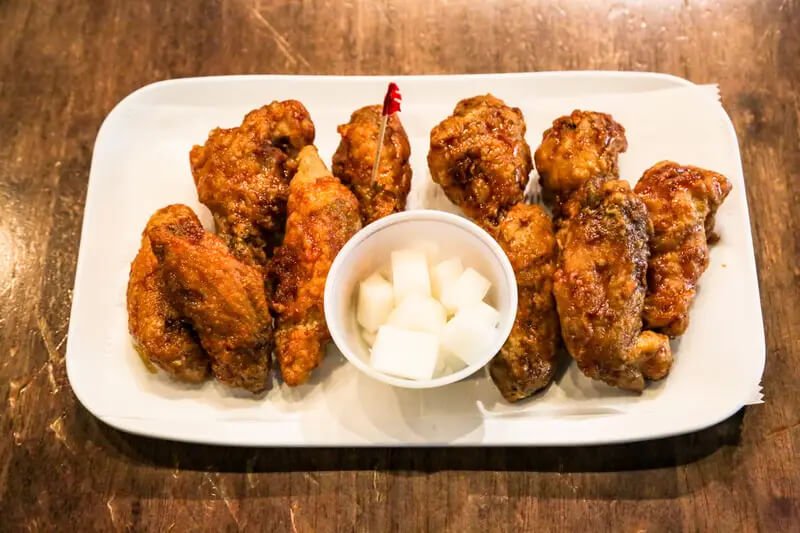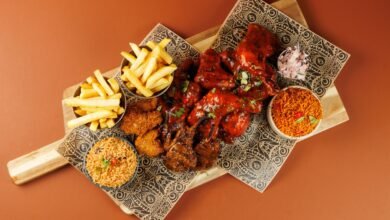Bonchon has established itself as a beloved destination for those craving authentic Korean fried chicken and a wide array of Korean comfort foods. With its roots in South Korea, Bonchon’s growth across the United States has been remarkable, drawing in customers with its flavorful and crispy fried chicken, which is a culinary experience unlike any other. This article will dive into Bonchon’s history, its unique recipes, and the various aspects that make it a standout restaurant, including comparisons to other fried chicken brands.
About Bonchon
Bonchon, which translates to “my hometown” in Korean, was founded in 2002 in Busan, South Korea, by Jinduk Seo. Seo’s goal was to bring the flavors of his hometown to the rest of the world, starting with the signature Korean fried chicken. Bonchon’s fried chicken is famous for its double-frying technique, resulting in an incredibly crispy exterior while maintaining a juicy interior. The chicken is then hand-brushed with one of two signature sauces: soy garlic or spicy. Over the years, the menu has expanded to include other Korean comfort dishes, such as bulgogi, bibimbap, and tteokbokki, appealing to both fried chicken lovers and Korean food enthusiasts alike.
Bonchon’s presence in the United States began in 2006 with the opening of its first U.S. location in Fort Lee, New Jersey. Since then, the brand has rapidly expanded, with over 100 locations across the country. The restaurant offers both dine-in and takeout options, with a casual yet modern ambiance that encourages guests to enjoy their meals in a relaxed setting.
| Category | Details |
|---|---|
| Founded | 2002 (Busan, South Korea) |
| Founder | Jinduk Seo |
| First U.S. Location | 2006 (Fort Lee, New Jersey) |
| Specialty | Korean Fried Chicken, Korean Comfort Foods |
| Signature Sauces | Soy Garlic, Spicy |
| U.S. Locations | Over 100 |
| Global Reach | Over 300 locations worldwide |
Why is Bonchon So Expensive?
One of the most common questions about Bonchon is why its food tends to be more expensive than other fried chicken chains. Several factors contribute to the higher price point:
- Premium Ingredients: Bonchon uses high-quality chicken and ingredients to ensure each dish is flavorful and fresh. The use of premium ingredients elevates the dining experience, but it also comes at a cost.
- Double-Frying Technique: The signature double-frying method requires more time, energy, and resources compared to traditional frying. This method, however, results in chicken with a crispier texture and richer flavor, which justifies the added expense.
- Labor-Intensive Process: Each piece of chicken is hand-brushed with sauce after frying, ensuring that the flavors are evenly distributed. This manual process is labor-intensive, contributing to the overall cost of the dish.
- Import of Authentic Korean Ingredients: Bonchon prides itself on using authentic Korean spices and sauces in its recipes. Some of these ingredients are imported from South Korea, adding to the cost of the final product.
- Ambiance and Experience: Bonchon locations are designed to offer a unique dining experience with a modern, cozy atmosphere. This is unlike typical fast-food chains, where speed is the primary focus.
- Franchise Costs: The operational costs associated with running a Bonchon franchise in the U.S. can be higher due to the training, specific kitchen setups, and the brand’s high standards for food quality.
| Reason | Details |
|---|---|
| Premium Ingredients | Use of high-quality chicken and fresh ingredients |
| Double-Frying Technique | Time and resource-intensive cooking method |
| Labor-Intensive Process | Hand-brushing of sauce on each piece of chicken |
| Authentic Ingredients | Imported Korean spices and sauces |
| Ambiance and Experience | Focus on providing a premium dining experience |
| Franchise Costs | Higher operational costs due to brand standards and training |
What Does Bonchon Mean in Korean?
In Korean, “Bonchon” translates to “my hometown” or “native village.” The name reflects the founder Jinduk Seo’s desire to bring the flavors and comfort of his hometown in South Korea to the rest of the world. The essence of Bonchon lies in delivering food that is reminiscent of home-cooked meals, providing a sense of nostalgia for those familiar with Korean cuisine and an introduction to authentic flavors for newcomers.
The name also conveys a sense of community and warmth, aligning with the restaurant’s goal of making customers feel at home while dining. Whether customers are visiting Bonchon for their famous fried chicken or other Korean comfort dishes, they are invited to experience a slice of Korean culture through its food.
| Term | Translation |
|---|---|
| Bonchon | “My hometown” or “native village” |
| Significance | Reflects the roots and comfort of home-cooked Korean meals |
Is Bonchon a Fast Food Restaurant?
While Bonchon offers the convenience of takeout and quick service, it differs significantly from typical fast-food chains. Here’s why:
- Cooking Method: Bonchon’s double-frying technique and hand-brushing of sauces require more time and precision than fast-food chains that prioritize speed. This results in longer preparation times, which is not typical of fast food.
- Menu Variety: Unlike fast-food restaurants that focus on burgers, fries, and simple fried items, Bonchon offers a diverse menu that includes Korean dishes such as bibimbap, japchae, and bulgogi. These dishes require more complex preparation and are rooted in traditional Korean cooking.
- Dine-In Experience: Bonchon locations provide a casual, sit-down dining experience with a modern ambiance. This contrasts with the grab-and-go nature of fast-food chains.
- Price Point: Bonchon’s pricing is higher than standard fast food due to the quality of ingredients, labor, and the cooking process involved. Customers are paying for an elevated culinary experience rather than a quick meal.
While Bonchon offers quick service options like takeout and delivery, it does not fit into the traditional definition of fast food due to its preparation methods, quality of food, and dining experience.
| Aspect | Bonchon | Typical Fast Food |
|---|---|---|
| Cooking Method | Double-fried, hand-brushed with sauce | Single fry, quick preparation |
| Menu | Korean fried chicken and diverse Korean dishes | Burgers, fries, simple fried items |
| Dine-In Experience | Casual, modern dining | Focus on quick service, often limited seating |
| Price Point | Higher due to premium ingredients and labor | Lower, focused on affordability |
Bonchon Vs Other Fried Chicken
When comparing Bonchon to other fried chicken brands such as KFC, Popeyes, and Chick-fil-A, there are several key differences that set it apart:
1. Frying Technique:
- Bonchon: Uses a double-frying method, which ensures a crispier exterior while keeping the meat inside juicy. Each piece is coated with a signature sauce (soy garlic or spicy) that adds layers of flavor.
- Other Fried Chicken Chains: Brands like KFC and Popeyes generally use a single frying method, which produces a crispy but less crunchy texture. These chains also focus on breading and seasoning rather than sauces.
2. Flavor Profile:
- Bonchon: Korean-inspired flavors such as soy garlic and spicy dominate the menu. The sauces are brushed onto the chicken, making every bite packed with flavor.
- Other Fried Chicken Chains: The flavor typically comes from the breading and seasoning. Popeyes is known for its Cajun-style spice, while KFC has its secret blend of 11 herbs and spices.
3. Menu Offerings:
- Bonchon: In addition to fried chicken, Bonchon offers a variety of Korean dishes such as kimchi, tteokbokki (spicy rice cakes), and japchae (glass noodles).
- Other Fried Chicken Chains: Other chains primarily focus on fried chicken, sandwiches, and sides such as mashed potatoes, coleslaw, and biscuits.
4. Cultural Influence:
- Bonchon: As a Korean brand, Bonchon brings authentic Korean flavors to the forefront of its menu. It introduces customers to Korean cuisine beyond just fried chicken, offering a more diverse cultural experience.
- Other Fried Chicken Chains: Brands like KFC, Popeyes, and Chick-fil-A are rooted in American Southern cuisine, with flavors and offerings that reflect this tradition.
| Aspect | Bonchon | KFC/Popeyes/Chick-fil-A |
|---|---|---|
| Frying Technique | Double-fried, hand-brushed with sauce | Single-fried, seasoned |
| Flavor Profile | Korean-inspired (soy garlic, spicy) | Southern-style (herbs and spices, Cajun) |
| Menu Offerings | Korean comfort food (bibimbap, japchae, etc.) | Primarily fried chicken and Southern sides |
| Cultural Influence | Korean cuisine and flavors | Southern American cuisine |
Conclusion
Bonchon has revolutionized the way people enjoy fried chicken, offering a unique take on a popular dish by infusing it with Korean culinary traditions. From its double-fried technique to its hand-brushed sauces, Bonchon sets itself apart from other fried chicken chains, providing a richer, more flavorful experience. The restaurant’s higher price point reflects the premium ingredients, labor-intensive process, and authentic Korean flavors that go into every dish.
As Bonchon continues to expand across the U.S., it introduces more people to the flavors of Korea, making it a beloved spot for food lovers looking for something beyond the ordinary. With a menu that offers not only Korean fried chicken but also a variety of traditional Korean dishes, Bonchon remains a leader in the fast-casual dining scene, blending convenience with an elevated dining experience.
Whether you’re craving crispy fried chicken or want to explore Korean comfort foods, Bonchon provides a dining experience that brings the flavors of Seoul to your plate, ensuring that every bite feels like a taste of home.




